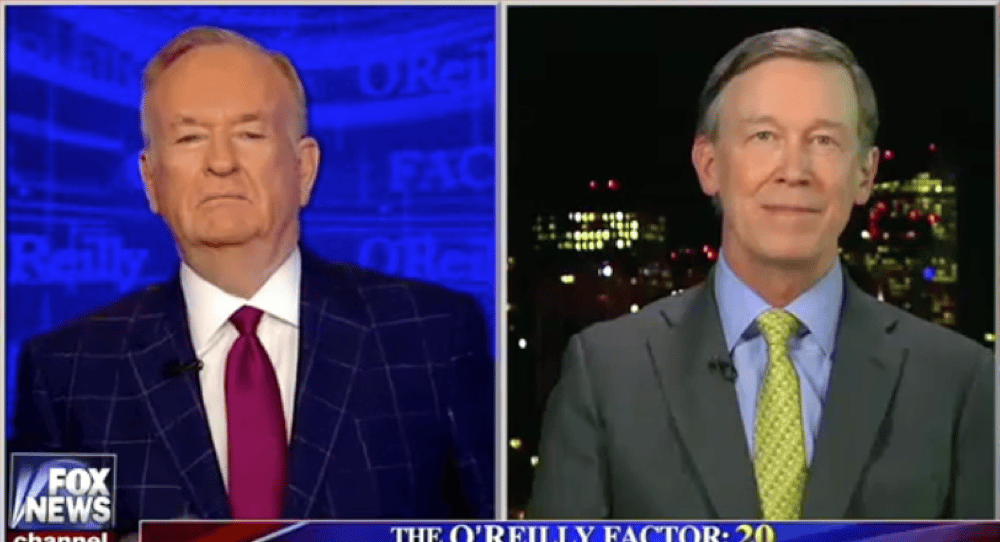Gov. John Hickenlooper listened to President Donald Trump's address to Congress and heard someone he could work with.
"It was certainly a different tone than we've seen before, and I think a welcome tone in that sense that he really did seem to be including people," Hickenlooper told Bill O'Reilly on Fox News' The O'Reilly Factor. "... He really did seem, around job creation and even immigration, which he amplified today, it looked like he was reaching out to people that maybe he didn't agree with and encouraging them to join him at the table and begin negotiating some of these issues."
"If the president is going to honor the complexity of these issues and the core values that so many of us hold dear, I think we're ready to sit down and work on some of these issues."
Hickenlooper's conciliatory tone is typical of the approach he's taken since Trump was elected. Earlier this month, he criticized the president's executive order on refugees, but in general, he's avoided the confrontational stance that many activists would prefer. Colorado is hoping to benefit from any infrastructure spending program that comes out of Washington, and Hickenlooper has repeatedly said he would like to work with the administration on job creation.
Hickenlooper said he hoped the Trump we saw in the speech and not the Trump of the campaign and of Twitter is the one we get going forward.
"The level of volatility that we've seen up until now, I don't see how it's sustainable," he said. "Hopefully this will mark the beginning of a new consistency, and we can really get down to work on these issues."
It's not clear what part of Trump's position on immigration Hickenlooper supports or thinks is the basis of compromise and reform. The president did use the words "real and positive immigration reform," but the only specific change he offered in his speech was prioritizing high-skill workers and making it harder for lower-skilled workers -- those who currently fill many service industry and agricultural jobs -- to enter the country legally.
"Switching away from this current system of lower-skilled immigration, and instead adopting a merit-based system, will have many benefits: it will save countless dollars, raise workers' wages, and help struggling families -- including immigrant families -- enter the middle class," he said. "I believe that real and positive immigration reform is possible, as long as we focus on the following goals: to improve jobs and wages for Americans, to strengthen our nation's security, and to restore respect for our laws."
To put that more simply: The president proposed reducing legal immigration.
Trump had put word out before his speech that there would be some sort of "compromise," but after the speech, advocates for immigrants described it as a bait-and-switch. Immigration hardliners in Congress reportedly are very happy with what they heard in the speech.
O'Reilly also asked Hickenlooper about Colorado's sanctuary cities.
"There are going to be crackdowns on sanctuary cities, Denver being one of them," he said. "Are you fearful that you'll lose some federal money and how will you rebut that if it does happen?"
Hickenlooper rejected the idea that Denver is a sanctuary city, a term that doesn't have a legal definition.
"If someone commits a crime in Denver and they don't have proper documentation, generally -- and I know there have been some screw-ups -- that name goes immediately over to ICE," Hickenlooper said.
The "screw-up" Hickenlooper's talking about -- not notifying ICE until half an hour before Ever Valles bonded out of jail on auto theft charges -- didn't actually involve not sending names over to ICE. The Denver Sheriff's Department sends fingerprints to the FBI and ICE, and ICE knows when people without legal status or in the jail. The law requires this. What Denver doesn't do is hold immigrants on "detainers" without a warrant beyond the time that they would otherwise be in jail. Trump's executive order seems to describe not honoring detainers as "sanctuary city" behavior, but no one knows yet how this will play out in practice.
Hickenlooper went on to say, "Countries come with borders. There's no question about that. We also have to make sure that we don't throw the baby out with the border. ... A lot of these guys have jobs!"
Hickenlooper also defended legal marijuana to O'Reilly, who said "a flood of homeless people and poor people came into Colorado because now they have easy access to the intoxicant."
"In downtown Denver there are a lot of people who are just stoned from morning to night because they can get this stuff," O'Reilly said.
Hickenlooper has previously suggested marijuana may be one factor involved in homelessness and suggested using marijuana tax money to help this population.
"There’s no question that marijuana and other drugs--in combination with mental illness or other disabling conditions are essential contributors to chronic homelessness," he said in his State of the State address.
But on The O'Reilly Factor, Hickenlooper said it's more complicated.
"We don't have evidence that this is because of marijuana. There are a lot of other social issues around homelessness and addiction," he said.














